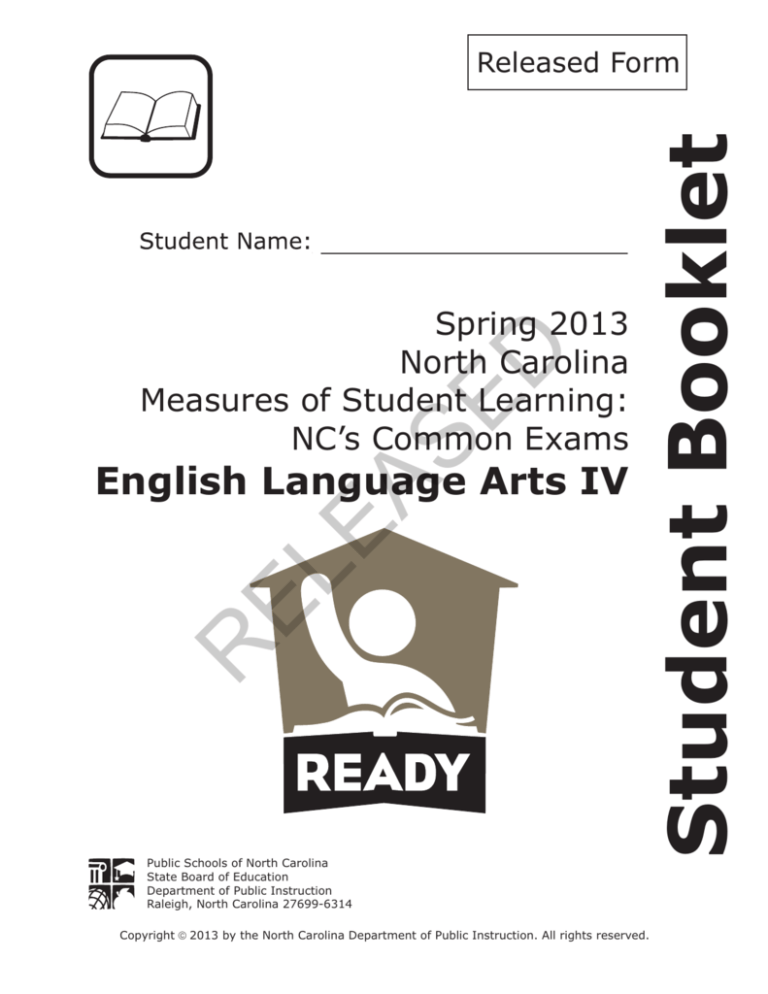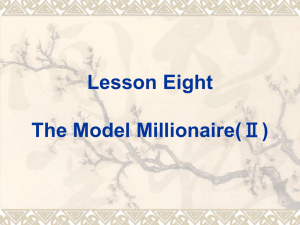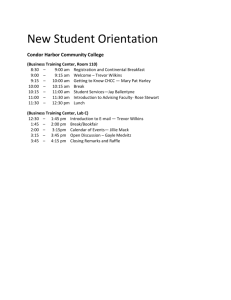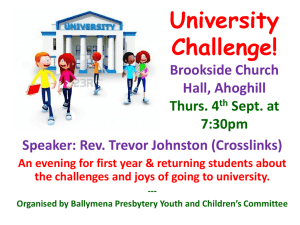
SE
D
Spring 2013
North Carolina
Measures of Student Learning:
NC’s Common Exams
R
EL
EA
English Language Arts IV
Public Schools of North Carolina
State Board of Education
Department of Public Instruction
Raleigh, North Carolina 27699-6314
Copyright ã 2013 by the North Carolina Department of Public Instruction. All rights reserved.
Student Booklet
Released Form
ENGLISH LANGUAGE ARTS IV — RELEASED FORM
Excerpt from “The Model Millionaire”
by Oscar Wilde
A note of admiration
EL
EA
SE
D
Unless one is wealthy there is no use in being a charming fellow. Romance is the
privilege of the rich, not the profession of the unemployed. The poor should be practical
and prosaic. It is better to have a permanent income than to be fascinating. These are
the great truths of modern life which Hughie Erskine never realized. Poor Hughie!
Intellectually, we must admit, he was not of much importance. He never said a brilliant
or even an ill-natured thing in his life. But then he was wonderfully good-looking, with
his crisp brown hair, his clear-cut profile, and his grey eyes. He was as popular with men
as he was with women, and he had every accomplishment except that of making money.
His father had bequeathed him his cavalry sword, and a History of the Peninsular War in
fifteen volumes. Hughie hung the first over his looking glass, put the second on a shelf
between Ruff’s Guide and Bailey’s Magazine, and lived on two hundred a year that an old
aunt allowed him. He had tried everything. He had gone on the Stock Exchange for
six months; but what was a butterfly to do among bulls and bears? He had been a
tea merchant for a little longer, but had soon tired of pekoe and souchong. . . .
Ultimately he became nothing, a delightful, ineffectual young man with a perfect profile
and no profession.
R
To make matters worse, he was in love. The girl he loved was Laura Merton, the
daughter of a retired Colonel who had lost his temper and his digestion in India, and had
never found either of them again. Laura adored him, and he was ready to kiss her
shoe-strings. They were the handsomest couple in London, and had not a penny-piece
between them. The Colonel was very fond of Hughie, but would not hear of any
engagement.
“Come to me, my boy, when you have got ten thousand pounds of your own, and we
will see about it,” he used to say; and Hughie looked very glum on those days, and had
to go to Laura for consolation.
One morning, as he was on his way to Holland Park, where the Mertons lived, he
dropped in to see a great friend of his, Alan Trevor. Trevor was a painter. Indeed, few
people escape that nowadays. But he was also an artist, and artists are rather rare.
Personally he was a strange rough fellow, with a freckled face and a red ragged beard.
However, when he took up the brush he was a real master, and his pictures were
1
Go to the next page.
ENGLISH LANGUAGE ARTS IV — RELEASED FORM
eagerly sought after. He had been very much attracted by Hughie at first, it must be
acknowledged, entirely on account of his personal charm. “The only people a painter
should know,” he used to say, “are people who are bête and beautiful, people who are
an artistic pleasure to look at and an intellectual repose to talk to. Men who are dandies
and women who are darlings rule the world, at least they should do so.” However, after
he got to know Hughie better, he liked him quite as much for his bright buoyant spirits
and his generous reckless nature, and had given him the permanent entrée to his
studio.
SE
D
When Hughie came in he found Trevor putting the finishing touches to a wonderful
life-size picture of a beggar-man. The beggar himself was standing on a raised platform
in a corner of the studio. He was a wizened old man, with a face like wrinkled
parchment, and a most piteous expression. Over his shoulders was flung a coarse brown
cloak, all tears and tatters; his thick boots were patched and cobbled, and with one hand
he leant on a rough stick, while with the other he held out his battered hat for alms.
“What an amazing model!” whispered Hughie, as he shook hands with his friend.
EA
“An amazing model?” shouted Trevor at the top of his voice; “I should think so! Such
beggars as he are not to be met with every day. A trouvaille, mon cher; a living
Velasquez! My stars! What an etching Rembrandt would have made of him!”
EL
“Poor old chap!” said Hughie, “How miserable he looks! But I suppose, to you painters,
his face is his fortune?”
“Certainly,” replied Trevor, “you don’t want a beggar to look happy, do you?”
R
“How much does a model get for sitting?” asked Hughie, as he found himself a
comfortable seat on a divan.
“A shilling an hour.”
“And how much do you get for your picture, Alan?”
“Oh, for this I get two thousand!”
“Pounds?”
“Guineas. Painters, poets, and physicians always get guineas.”
2
Go to the next page.
ENGLISH LANGUAGE ARTS IV — RELEASED FORM
“Well, I think the model should have a percentage,” cried Hughie, laughing; “they work
quite as hard as you do.”
“Nonsense, nonsense! Why, look at the trouble of laying on the paint alone, and
standing all day long at one’s easel! It’s all very well, Hughie, for you to talk, but I
assure you that there are moments when Art almost attains to the dignity of manual
labor. But you mustn’t chatter; I’m very busy. . . .”
After some time the servant came in, and told Trevor that the frame-maker wanted to
speak to him.
D
“Don’t run away, Hughie,” he said, as he went out, “I will be back in a moment.”
EA
SE
The old beggar-man took advantage of Trevor’s absence to rest for a moment on a
wooden bench that was behind him. He looked so forlorn and wretched that Hughie
could not help pitying him, and felt in his pockets to see what money he had. All he
could find was a sovereign and some coppers. “Poor old fellow,” he thought to himself,
“he wants it more than I do, but it means no hansoms for a fortnight;” and he walked
across the studio and slipped the sovereign into the beggar’s hand.
The old man started, and a faint smile flitted across his withered lips. “Thank you, sir,”
he said, “thank you.”
EL
22
Then Trevor arrived, and Hughie took his leave, blushing a little at what he had done.
He spent the day with Laura, got a charming scolding for his extravagance, and had to
walk home.
R
That night he strolled into the Palette Club about eleven o’clock, and found Trevor sitting
by himself. . . .
“Well, Alan, did you get the picture finished all right?” he said. . . .
“Finished and framed, my boy!” answered Trevor; “and, by-the-bye, you have made a
conquest. That old model you saw is quite devoted to you. I had to tell him all about
you—who you are, where you live, what your income is, what prospects you have—”
“My dear Alan,” cried Hughie, “I shall probably find him waiting for me when I go home.
But of course you are only joking. Poor old wretch! I wish I could do something for him.
I think it is dreadful that any one should be so miserable. I have got heaps of old clothes
at home—do you think he would care for any of them? Why, his rags were falling to
bits.”
3
Go to the next page.
ENGLISH LANGUAGE ARTS IV — RELEASED FORM
“But he looks splendid in them,” said Trevor. “I wouldn’t paint him in a frock-coat for
anything. What you call rags I call romance. What seems poverty to you is
picturesqueness to me. However, I’ll tell him of your offer.”
“Alan,” said Hughie seriously, “you painters are a heartless lot.”
“An artist’s heart is his head,” replied Trevor; “and besides, our business is to realize the
world as we see it, not to reform it as we know it. Á chacun son métier. And now tell me
how Laura is. The old model was quite interested in her.”
“You don’t mean to say you talked to him about her?” said Hughie.
D
“Certainly I did. He knows all about the relentless colonel, the lovely Laura, and the
£10,000.”
SE
“You told that old beggar all my private affairs?” cried Hughie, looking very red and
angry.
EA
“My dear boy,” said Trevor, smiling, “that old beggar, as you call him, is one of the
richest men in Europe. He could buy all London tomorrow without overdrawing his
account. He has a house in every capital, dines off gold plate, and can prevent Russia
going to war when he chooses.”
EL
“What on earth do you mean?” exclaimed Hughie.
R
“What I say,” said Trevor. “The old man you saw today in the studio was Baron
Hausberg. He is a great friend of mine, buys all my pictures and that sort of thing, and
gave me a commission a month ago to paint him as a beggar. Que voulez-vous? La
fantaisie d’un millionnaire! And I must say he made a magnificent figure in his rags, or
perhaps I should say in my rags; they are an old suit I got in Spain.”
“Baron Hausberg!” cried Hughie. “. . . I gave him a sovereign!” and he sank into an
armchair the picture of dismay.
“Gave him a sovereign!” shouted Trevor, and he burst into a roar of laughter. “My dear
boy, you’ll never see it again. Son affaire c’est l’argent des autres.”
“I think you might have told me, Alan,” said Hughie sulkily, “and not have let me make
such a fool of myself.”
“Well, to begin with, Hughie,” said Trevor, “it never entered my mind that you went
about distributing alms in that reckless way. I can understand your kissing a pretty
4
Go to the next page.
ENGLISH LANGUAGE ARTS IV — RELEASED FORM
model, but your giving a sovereign to an ugly one—by Jove, no! Besides, the fact is that
I really was not at home today to any one; and when you came in I didn’t know whether
Hausberg would like his name mentioned. You know he wasn’t in full dress.”
“What a duffer he must think me!” said Hughie.
“Not at all. He was in the highest spirits after you left; kept chuckling to himself and
rubbing his old wrinkled hands together. I couldn’t make out why he was so interested
to know all about you; but I see it all now. He’ll invest your sovereign for you, Hughie,
pay you the interest every six months, and have a capital story to tell after dinner.”
D
“I am an unlucky devil,” growled Hughie. “The best thing I can do is to go to bed; and,
my dear Alan, you mustn’t tell anyone. I shouldn’t dare show my face in the Row.”
SE
“Nonsense! It reflects the highest credit on your philanthropic spirit, Hughie. And don't
run away. . . . You can talk about Laura as much as you like.”
EA
However, Hughie wouldn’t stop, but walked home, feeling very unhappy, and leaving
Alan Trevor in fits of laughter.
The next morning, as he was at breakfast, the servant brought him up a card on which
was written, “Monsieur Gustave Naudin, de la part de M. le Baron Hausberg.”
EL
“I suppose he has come for an apology,” said Hughie to himself; and he told the servant
to show the visitor up.
R
An old gentleman with gold spectacles and grey hair came into the room, and said, in a
slight French accent, “Have I the honor of addressing Monsieur Erskine?”
Hughie bowed.
“I have come from Baron Hausberg,” he continued. “The Baron—”
“I beg, sir, that you will offer him my sincerest apologies,” stammered Hughie.
“The Baron,” said the old gentleman, with a smile, “has commissioned me to bring you
this letter;” and he extended a sealed envelope.
On the outside was written, “A wedding present to Hugh Erskine and Laura Merton, from
an old beggar,” and inside was a cheque for £10,000.
5
Go to the next page.
ENGLISH LANGUAGE ARTS IV — RELEASED FORM
When they were married Alan Trevor was the best man, and the Baron made a speech
at the wedding breakfast.
“Millionaire models,” remarked Alan, “are rare enough; but, by Jove, model millionaires
are rarer still!”
Art is one of Hughie Erskine’s favorite pastimes.
B
Hughie Erskine, a poor man, is repaid for his sacrifice.
C
Laura Merton’s father refuses to allow her to marry Hughie Erskine.
D
Hughie Erskine gives money to those he considers more unfortunate than
himself.
EA
SE
D
A
In the first paragraph, what does the phrase “Romance is the privilege of the rich,
not the profession of the unemployed” imply?
EL
2
Which statement represents the central idea of the selection?
A
Unemployed people do not have a profession.
B
Rich people are more privileged than poor people.
C
People without money are not destined to find love.
D
Anyone can find love, but rich people have more time to look.
R
1
6
Go to the next page.
ENGLISH LANGUAGE ARTS IV — RELEASED FORM
In the first paragraph, what is the effect of using the word prosaic rather than the
word dull?
A
The longer word confuses the reader and foreshadows the difficulty of the
story.
B
The elevated diction of the former indicates the attitude and status of the
narrator.
C
The lower level of diction would allow for a younger audience that might not
understand the theme.
D
The word choice characterizes the narrator as a sloppy person who does not
choose his words carefully.
In the context of the selection, what is implied about Hughie based on the
statement, “what was a butterfly to do among bulls and bears”?
Hughie was not able to compete among the other stockbrokers at the
Stock Exchange, because he was passive.
B
Hughie preferred fashionable suits to the traditional business suits that most
men wore.
C
Hughie was not smart enough to surpass the men with experience at the
Stock Exchange.
D
Hughie had a hard time adjusting to a working man’s life because he
preferred to be social and attend parties.
EL
EA
A
R
4
SE
D
3
7
Go to the next page.
ENGLISH LANGUAGE ARTS IV — RELEASED FORM
He loses everything, all of his money and his hope for the future.
B
He lives the rest of his life in shame and without any friends.
C
He ends up with a better future than he once thought possible.
D
He goes to live with the beggar after his marriage to Laura.
D
In paragraph 22, what is the effect of using the word charming to describe the
scolding that Hughie receives from Laura?
It shows that Laura loves Hughie too much to be angry with him.
B
It shows that Laura thinks of Hughie as a child instead of an equal.
C
It demonstrates that the scolding was very intense toward Hughie.
D
It demonstrates that the scolding will not be very effective on Hughie.
SE
A
EA
7
A
What is the effect of the author’s use of language to foreshadow the ending?
EL
6
How does Hughie’s pity for the beggar impact Hughie’s life later in the selection?
A
The happiness that the apparent beggar displays when receiving the money
indicates his true status.
B
The carefree atmosphere at the frame-maker’s belies the angry tones.
C
Hughie and Alan have a serious discussion about how poverty affects people.
D
Hughie and Alan have an amused tone when referring to the apparent
beggar.
R
5
8
Go to the next page.
ENGLISH LANGUAGE ARTS IV — RELEASED FORM
A
People are more important than art.
B
Art should be about difficult topics.
C
Art does not have to teach a moral lesson.
D
People should respect the many forms of art.
D
How does the author develop the character of Hughie Erskine?
by explaining the Baron’s monetary gift
B
by giving details about his generosity
C
through scenes with his friend Alan, who is painting a beggar
D
through dialogue with his girlfriend’s father about marriage
EA
SE
A
EL
9
What tenet of the “Aesthetic Movement” is reflected in the narrator’s ironic point of
view?
R
8
9
Go to the next page.
ENGLISH LANGUAGE ARTS IV — RELEASED FORM
The question you read next will require you to answer in writing.
1. Write your answer on separate paper.
2. Be sure to write your name on each page.
Based on the first paragraph, how does the quote below set the tone for the
selection? Include one example from the text to support your answer.
EL
EA
SE
D
“Romance is the privilege of the rich, not the profession of the unemployed.”
R
10
10
Go to the next page.
ENGLISH LANGUAGE ARTS IV — RELEASED FORM
The Nightingale
by Mark Akenside
D
5
To-night retired, the queen of heaven
With young Endymion stays;
And now to Hesper it is given
Awhile to rule the vacant sky,
Till she shall to her lamp supply
A stream of brighter rays.
SE
To them, by many a grateful song
In happier seasons vow’d,
These lawns, Olympia’s haunts, belong:
Oft by yon silver stream we walk’d,
Or fix’d, while Philomela talk’d,
Beneath yon copses stood.
EL
15
EA
10
Propitious send thy golden ray,
Thou purest light above!
Let no false flame seduce to stray
Where gulf or steep lie hid for harm;
But lead where music’s healing charm
May soothe afflicted love.
Nor seldom, where the beechen boughs
That roofless tower invade,
We came, while her enchanting Muse
The radiant moon above us held:
Till, by a clamorous owl compell’d,
She fled the solemn shade.
R
20
25
30
But hark! I hear her liquid tone!
Now Hesper guide my feet!
Down the red marl with moss o’ergrown,
Through yon wild thicket next the plain,
Whose hawthorns choke the winding lane
Which leads to her retreat.
11
Go to the next page.
ENGLISH LANGUAGE ARTS IV — RELEASED FORM
35
Hark! how through many a melting note
She now prolongs her lays:
How sweetly down the void they float!
The breeze their magic path attends;
The stars shine out; the forest bends;
The wakeful heifers graze.
D
40
See the green space: on either hand
Enlarged it spreads around:
See, in the midst she takes her stand,
Where one old oak his awful shade
Extends o’er half the level mead,
Enclosed in woods profound.
SE
O think, o’er all this mortal stage
What mournful scenes arise:
What ruin waits on kingly rage;
How often virtue dwells with woe;
How many griefs from knowledge flow;
How swiftly pleasure flies!
EL
50
EA
45
Whoe’er thou art whom chance may bring
To this sequester’d spot,
If then the plaintive Siren sing,
O softly tread beneath her bower
And think of Heaven’s disposing power,
Of man’s uncertain lot.
O sacred bird! let me at eve,
Thus wandering all alone,
Thy tender counsel oft receive,
Bear witness to thy pensive airs,
And pity Nature’s common cares,
Till I forget my own.
R
55
60
12
Go to the next page.
ENGLISH LANGUAGE ARTS IV — RELEASED FORM
13
A
The speaker has lost his one true love.
B
The speaker uses nature to disregard problems.
C
The speaker is on a quest to find a nightingale.
D
The speaker is passionate about reading Greek mythology.
D
What can be inferred from the poem?
The speaker is inspired by the bird’s ability to sing beautifully despite the
hardships of the world.
B
The speaker is critiquing how the bird’s music can influence other people’s
view of the world.
C
The speaker is determined to show the world how a bird’s music transforms
lives.
D
The speaker is horrified that the world disrespects the power of a bird’s
song.
EA
SE
A
EL
12
Which statement provides an objective summary of the text?
According to the first stanza of the poem, who is the “queen of heaven”?
A
the nightingale
B
Hesper
C
Endymion
D
the sun
R
11
13
Go to the next page.
ENGLISH LANGUAGE ARTS IV — RELEASED FORM
atrociously
B
discreetly
C
benevolently
D
instantaneously
D
What is the effect of using the word afflicted in the second stanza rather than the
word grievous?
It shows that songs can heal the pain of love.
B
It conveys the idea that love is a choice that can harm.
C
It explains why men can become bitter and melancholic.
D
It describes a lonesome man instead of a jealous one.
SE
A
EA
16
A
What is the effect of the use of the word choke in line 29?
EL
15
In the second stanza, what does propitious mean?
A
It demonstrates there is no peace for the speaker.
B
It demonstrates there is no escape for the nightingale.
C
It illustrates how attractive this area is for the nightingale.
D
It illustrates how confusing this experience is for the speaker.
R
14
14
Go to the next page.
ENGLISH LANGUAGE ARTS IV — RELEASED FORM
19
A
It is arduous to make decisions.
B
Nature does not trust humans.
C
No one knows what will happen in life.
D
Love is difficult to maintain sometimes.
D
How does the author’s choice of words in lines 49–54 impact the meaning of the
poem?
The author’s choice of words displays the difference between problems of
humans versus nature.
B
The author’s choice of words furnishes a reason to search for the
nightingale.
C
The author’s choice of words shows how unproblematic it is to begin a war.
D
The author’s choice of words provides an outlet for the speaker’s problems.
EA
SE
A
EL
18
Based on stanza 8, what does “Of man’s uncertain lot” mean?
What can be inferred from the last stanza of the poem?
A
The nightingale’s song is beautiful no matter what.
B
The bird helps the speaker better understand nature.
C
The problems in nature outweigh the problems of the speaker.
D
The song of the nightingale helps the speaker to forget his own problems in
life.
R
17
15
Go to the next page.
ENGLISH LANGUAGE ARTS IV — RELEASED FORM
The question you read next will require you to answer in writing.
1. Write your answer on separate paper.
2. Be sure to write your name on each page.
EL
EA
SE
D
According to the last stanza, what is implied about the speaker? Include one
example from the text to support your answer.
R
20
16
Go to the next page.
ENGLISH LANGUAGE ARTS IV — RELEASED FORM
Hamlet
by William Hazlitt
R
EL
EA
SE
D
It is the one of Shakespeare’s plays that we think of the oftenest, because it sounds
most in striking reflections on human life, and because the distresses of Hamlet are
transferred, by the turn of his mind, to the general account of humanity. Whatever
happens to him, we apply to ourselves, because he applies it to himself as a means of
general reasoning. He is a great moralizer; and what makes him worth attending to is
that he moralizes on his own feelings and experience. He is not a commonplace pedant.
If Lear is distinguished by the greatest depth of passion, Hamlet is the most remarkable
for the ingenuity, originality, and unstudied development of character. Shakespeare had
more magnanimity than any other poet, and he has shown more of it in this play than in
any other. There is no attempt to force an interest: everything is left for time and
circumstances to unfold. The attention is excited without effort; the incidents succeed
each other as matters of course; the characters think, and speak, and act just as they
might do if left entirely to themselves. There is no set purpose, no straining at a point.
The observations are suggested by the passing scene—the gusts of passion come and go
like sounds of music borne on the wind. The whole play is an exact transcript of what
might be supposed to have taken place at the court of Denmark at the remote period of
time fixt upon, before the modern refinements in morals and manners were heard of. It
would have been interesting enough to have been admitted as a bystander in such a
scene, at such a time, to have heard and witnessed something of what was going on.
But here we are more than spectators. We have not only “the outward pageants and the
signs of grief,” but “we have that within which passes show.” We read the thoughts of
the heart, we catch the passions living as they rise. Other dramatic writers give us very
fine versions and paraphrases of nature; but Shakespeare, together with his own
comments, gives us the original text, that we may judge for ourselves. This is a very
great advantage.
2
The character of Hamlet stands quite by itself. It is not a character marked by strength
of will or even of passion, but by refinement of thought and sentiment. Hamlet is as little
of the hero as a man can well be; but he is a young and princely novice, full of high
enthusiasm and quick sensibility—the sport of circumstances, questioning with fortune,
and refining on his own feelings, and forced from the natural bias of his disposition by
the strangeness of his situation. He seems incapable of deliberate action, and is only
hurried into extremities on the spur of the occasion, when he has no time to reflect—as
in the scene where he kills Polonius; and, again, where he alters the letters which
Rosencrantz and Guildenstern are taking with them to England, purporting his death. At
other times, when he is most bound to act, he remains puzzled, undecided, and
17
Go to the next page.
ENGLISH LANGUAGE ARTS IV — RELEASED FORM
skeptical; dallies with his purposes till the occasion is lost, and finds out some pretense
to relapse into indolence and thoughtfulness again. For this reason he refuses to kill the
king when he is at his prayers; and, by a refinement in malice, which is in truth only an
excuse for his own want of resolution, defers his revenge to a more fatal
opportunity. . . .
R
EL
EA
SE
D
The moral perfection of this character has been called in question, we think, by those
who did not understand it. It is more interesting than according to rules; amiable tho not
faultless. The ethical delineations of “that noble and liberal casuist”—as Shakespeare has
been well called—do not exhibit the drab-colored Quakerism of morality. His plays are
not copied either from “The Whole Duty of Man” or from “The Academy of
Compliments!” We confess we are a little shocked at the want of refinement in those
who are shocked at the want of refinement in Hamlet. The neglect of punctilious
exactness in his behavior either partakes of the “license of the time,” or else belongs to
the very excess of intellectual refinement in the character, which makes the common
rules of life, as well as his own purposes, sit loose upon him. He may be said to be
amenable only to the tribunal of his own thoughts, and is too much taken up with the
airy world of contemplation, to lay as much stress as he ought on the practical
consequences of things. His habitual principles of action are unhinged and out of joint
with the time. His conduct to Ophelia is quite natural in his circumstances. It is that of
assumed severity only. It is the effect of disappointed hope, of bitter regrets, of affection
suspended, not obliterated, by the distractions of the scene around him! Amidst the
natural and preternatural horrors of his situation, he might be excused in delicacy from
carrying on a regular courtship. When “his father’s spirit was in arms,” it was not a time
for the son to court. He could neither marry Ophelia, nor wound her mind by explaining
the cause of his alienation, which he durst hardly trust himself to think of. It would have
taken him years to have come to a direct explanation on the point. In the harassed state
of his mind, he could not have done much otherwise than he did. His conduct does not
contradict what he says when he sees her funeral:
I loved Ophelia; forty thousand brothers
Could not, with all their quantity of love,
Make up my sum.
18
Go to the next page.
ENGLISH LANGUAGE ARTS IV — RELEASED FORM
Which statement provides an objective summary of the selection?
A
Hazlitt admires the play because of the fantastical nature of the events that
occur.
B
Hazlitt admires Shakespeare for the development of a precise, historical
setting for his plays.
C
Hazlitt admires Shakespeare for addressing the politics of his time in
innovative ways.
D
Hazlitt admires the play because of Shakespeare’s ability to create
realistically flawed characters.
He means that many people are familiar with the play.
B
He means that the play has the same tone as Shakespeare’s other plays.
C
He ties the phrase to the word striking to indicate that the play has a strong
effect on the reader.
D
He ties the phrase to the word reflections to show that memories are the
keys to understanding our past.
EA
A
EL
23
In the first sentence, what does the author mean by the phrase “sounds most”?
Which quote from the first paragraph supports the author’s purpose for writing this
selection?
R
22
SE
D
21
A
“Lear is distinguished by the greatest depth of passion.”
B
“Hamlet is the most remarkable for the ingenuity, originality, and unstudied
development of character.”
C
“There is no set purpose, no straining at a point.”
D
“Other dramatic writers give us very fine versions and paraphrases of
nature.”
19
Go to the next page.
ENGLISH LANGUAGE ARTS IV — RELEASED FORM
What is the role of the figurative language in the first paragraph?
A
The author’s use of the onomatopoeia “the gusts of passion come and go like
sounds of music borne on the wind” imitates the mood of the scene.
B
The author’s use of the simile “the gusts of passion come and go like sounds
of music borne on the wind” suggests the play’s realistic setting.
C
The metaphorical use of the observations of the characters indicates that
“the gusts of passion come and go like sounds of music borne on the wind.”
D
The oxymoron, “the gusts of passion come and go like sounds of music
borne on the wind,” intentionally gives order to the disorder of the play.
26
How does the phrase “the characters think, and speak, and act” in the first
paragraph help to refine the author’s idea?
The phrase contradicts Shakespeare’s intentional attempt to portray the
chaos surrounding the succession of the king.
B
The phrase demonstrates the sequential order that the characters follow in
their actions.
C
The phrase perpetuates an imaginary idyll that contrasts with the chaotic
disorganization of the play.
D
The phrase demonstrates a parallel structure that illustrates the systematic,
ordered nature of the play.
EL
EA
A
R
25
SE
D
24
How does paragraph 2 of the selection contribute to the author’s purpose?
A
It conveys specific details about Shakespeare as a child.
B
It demonstrates why Hamlet is classified as a villain.
C
It gives more details about the events of the play.
D
It explains why Hamlet behaves the way he does in the play.
20
Go to the next page.
ENGLISH LANGUAGE ARTS IV — RELEASED FORM
showing a lack of attention to detail
B
demonstrating the ability to be on time
C
showing an inability to work with others
D
demonstrating the ability to behave well
D
How does the author explain Hamlet’s interaction with Ophelia?
He claims that Hamlet wanted to be cruel to her, but was influenced by his
family.
B
He says that Hamlet was unable to carry on a relationship with her because
of her father’s disapproval.
C
He states Hamlet was unable to explain to her what was wrong with him.
D
He says that Hamlet’s behavior toward her did not reflect his true feelings.
SE
A
EA
29
A
What effect on the reader does the author wish to achieve by his frequent use of
the pronoun “we”?
EL
28
In the last paragraph, what does “neglect of punctilious exactness” mean?
A
a feeling of being persuaded to adopt the author’s point of view
B
an assumption that the text is being directed to both the reader and the
author
C
a feeling that the author is arrogant in the expression of his opinion
D
an assumption that the author is speaking from an uncommon point of view
R
27
21
Go to the next page.
ENGLISH LANGUAGE ARTS IV — RELEASED FORM
The question you read next will require you to answer in writing.
1. Write your answer on separate paper.
2. Be sure to write your name on each page.
EL
EA
SE
D
Based on the selection, what can be inferred about the author’s feelings
toward Hamlet? Explain the inference. Include two examples from the text to
support your answer.
R
30
22
Go to the next page.
ENGLISH LANGUAGE ARTS IV — RELEASED FORM
This is the end of the English Language Arts IV test.
1. Look back over your answers.
2. Put all of your papers inside your test book and close the test book.
R
EL
EA
SE
D
3. Stay quietly in your seat until your teacher tells you that testing is
finished.
23
D
SE
EA
EL
R
ACKNOWLEDGMENTS
The North Carolina Department of Public Instruction wishes to express gratitude to the following
authors and publishers, whose generous permission to reprint literary selections has made these
tests possible. Every effort has been made to locate the copyright owners of material reprinted in
this test booklet. Omissions brought to our attention will be corrected in subsequent editions.
Excerpt from “The Model Millionaire” by Oscar Wilde from www.classicreader.com/book/1973/1/
(03/06/2012).
“The Nightingale” by Mark Akenside from http://www.your-content.net/mark-kenside/nightingale401 (04/05/2012).
“Hamlet” by William Hazlitt from The Best of the World’s Classics, Restricted to Prose, Vol. V, Great
Britain and Ireland—III. Project Gutenberg, 2007. http://www.gutenberg.org/ebooks/22182
(04/19/2012).
E
NGLISH LANGUAGE ARTS IV — RELEASED FORM
English Language Arts IV
RELEASED Form
Spring 2013
Answer Key
Type
Key
Primary Standard(s)
1
MC
B
RL — Reading: Literature
2
MC
C
RL — Reading: Literature
3
MC
B
L — Language
4
MC
A
RL — Reading: Literature
5
MC
C
RL — Reading: Literature
6
MC
A
7
MC
D
8
MC
C
9
MC
10
CR
11
MC
SE
D
Item number
L — Language
EA
RL — Reading: Literature
RL — Reading: Literature
RL — Reading: Literature
Rubric
W — Writing
RL — Reading: Literature
B
RL — Reading: Literature
MC
A
RL — Reading: Literature
MC
D
RL — Reading: Literature
MC
C
L — Language
MC
A
L — Language
16
MC
B
RL — Reading: Literature
17
MC
C
L — Language
18
MC
A
RL — Reading: Literature
19
MC
D
RL — Reading: Literature
20
CR
Rubric
W — Writing
RL — Reading: Literature
21
MC
D
RI — Reading: Informational Text
22
MC
C
RI — Reading: Informational Text
13
14
15
R
12
EL
C
1
E
NGLISH LANGUAGE ARTS IV — RELEASED FORM
Type
Key
23
MC
B
RI — Reading: Informational Text
24
MC
B
L — Language
25
MC
D
RI — Reading: Informational Text
26
MC
D
RI — Reading: Informational Text
27
MC
A
RI — Reading: Informational Text
28
MC
D
RI — Reading: Informational Text
29
MC
B
RI — Reading: Informational Text
30
CR
Rubric
W — Writing
RI — Reading: Informational Text
SE
Primary Standard(s)
D
Item number
Item Types:
MC = multiple choice
CR = constructed response
EA
R
EL
Note about selections:
Reading for literature texts can be stories or poems.
Reading for informational texts can be scientific, historical, economic, or technical. Language and writing items may be associated with reading for literature or informational
texts.
2












